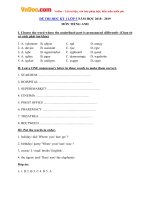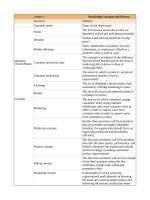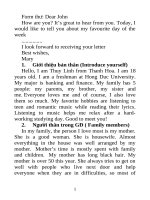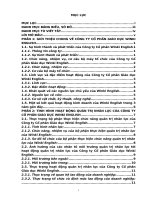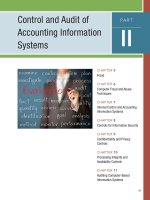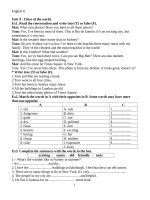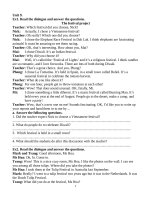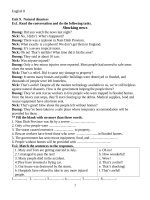English grammar Adjectives
Bạn đang xem bản rút gọn của tài liệu. Xem và tải ngay bản đầy đủ của tài liệu tại đây (90.13 KB, 10 trang )
English Grammar Course
Course: 2020-2022
Topic: Adjectives
Absolute adjectives
1. Some adjectives express ideas that cannot be graded. For
example, a person can’t be more or less dead. In the same way, a
sphere can’t be more or less round. In grammars these adjectives
are called non-gradable or absolute adjectives.
Non-gradable adjectives do not have comparative or superlative
forms. There are very few non-gradable adjectives, so you can
learn them by heart if you really want. Here is a list of common
non-gradable adjectives in English. Note that this is not a
comprehensive list.
Absolute, impossible, principal, adequate, inevitable, sufficient,
complete, main, unanimous, unavoidable, entire, minor, fatal,
unique, final, universal, ideal, whole, preferable, dead etc.
2. Exceptions
Although the adjectives given above are not normally used in
comparative and superlative forms, you might still hear
expressions like more complete or most perfect. Though
incorrect, these expressions are quite common in speech and
they have become sort of acceptable, too. However, if you are a
careful user of the language, you must avoid them especially in
writing.
3. Also be careful, not to use more along with a comparative
adjective ending in –er and most with a superlative adjective
ending in -est. Do not write more taller or most smartest. These
are examples of double comparatives and superlatives. They are
always wrong and must be avoided.
EX: She is prettier than her sister. (NOT She is more prettier than
her sister.)
4. Some compound adjectives have two possible comparatives
and superlatives.
EX1: Positive: good-looking
Comparative: better-looking or more good-looking
Superlative: best-looking or most good-looking
EX2: Positive: well-known
Comparative: better-known or more well-known
Superlative: best-known or most well-known
In this case, you can decide which form you want to use, but don’t
write most best-known or more better-looking.
Adjective phrase
1. A word group that has an adjective as its head is called an
adjective phrase. Note that the adjective in this phrase may be
accompanied by other words such as determiners, modifiers etc.
Adjective phrases can go before a noun (attributive position).
They can also go after a linking verb like be (predicative position).
EX: He was wearing a dark brown suit. (Here the adjective phrase
‘a dark brown’ modifies the noun suit.)
The fish tasted awfully funny. (Here the adjective phrase ‘awfully
funny’ says something about the fish. It goes after the copular or
linking verb tasted.
2. A copular verb does not take an object and it cannot be
modified by an adverb. The word or phrase that follows a copular
verb typically says something about the subject of the sentence.
EX: The fish tasted awful. (NOT The fish tasted awfully.)
Here the adjective awful says something about the fish. It doesn’t
modify the verb tasted.
3. Note that the adjective in an adjective phrase may be modified
by an adverb. When it is modified by an adverb, the adverb goes
before the adjective. The adjective may also be modified by other
determiners like articles, possessives and demonstratives.
Consider the phrase ‘my cute little daughter’
Here the adjective phrase ‘my cute little’ consists of a possessive
(my) and two adjectives (cute and little).
4. Sometimes the idea expressed by an adjective can also be
expressed using a noun phrase. Consider the examples given
below.
EX: Brutus is an honorable man. (Here the adjective honorable
modifies the noun man.)
The same idea can be expressed using the phrase: a man of
honor
EX: Brutus is a man of honor.
Another example is given below.
Churchill was an eminent man. (Here the adjective eminent
modifies the noun man.)
Churchill was a man of eminence. (Here the noun phrase ‘a man
of eminence’ means the same as the phrase ‘an eminent man’.)
Adjective Or Participle
Participles can also act as adjectives. In this case, they modify
nouns. Sometimes participles are used as adjectives after be or
other copular verbs. In this case, they complete the predicate.
When participles help to form continuous and perfect tenses, they
act as participles.
This grammar exercise tests your ability to recognize participles
and adjectives.
1. She was excited about the project.
A. Excited is an adjective
B. Excited is a past participle
EXP: Excited is an adjective here and it acts as the complement
of the verb was.
2. I watched an interesting movie yesterday.
A. Interesting is an adjective
B. Interesting is a present participle
EXP: When ing forms are used before nouns they act as
adjectives.
3. She was driving us crazy.
A. Driving is an adjective
B. Driving is a present participle
EXP: When ing forms are used to form continuous tenses, they
are used as participles.
4. I hope you are fully recovered from your operation.
A. Recovered is an adjective
B. Recovered is a past participle
EXP: Recovered is an adjective here. Participles are often used
after the verb be. In this case, they complete the predicate and
act as adjectives.
5. Her idea seems exciting.
A. Exciting is an adjective
B. Exciting is a present participle
EXP: Participles are often used as adjectives after be and other
copular verbs.
6. The children were screaming at the top of their voice.
A. Screaming is an adjective
B. Screaming is a present participle
EXP: When ing forms are used to form continuous tenses, they
act as present participles.
7. I had warned you.
A. Warned is an adjective
B. Warned is a past participle
EXP: When participles are used to form perfect tenses, they act
as past participles.
8. He was not expecting this.
A. Expecting is an adjective
B. Expecting is a present participle
EXP: When participles are used to form continuous tenses, they
act as present participles.
9. It was beginning to rain.
A. Beginning is an adjective
B. Beginning is a present participle
EXP: When ing forms are used to form continuous tenses, they
act as present participles.
10. I did not enjoy the party because I was bored.
A. Bored is an adjective
B. Bored is a past participle
EXP: Participles are often used after the verb be as adjectives. In
this case, they complete the verb.
11. They have not been able to find the missing child.
A. Missing is an adjective
B. Missing is a present participle
EXP: When ing forms are used before nouns, they act as
adjectives.
12. She is retired now.
A. Retired is an adjective
B. Retired is a past participle
EXP: Participles are often used after the verb be as adjectives. In
this case, they complete the verb.
Adjectives Exercise
Fill in the blanks.
1. Of the two sisters, Susie is the ……………………..
A. older
B. oldest
EXP: We do not normally use the superlative to talk about two
people or things.
2. Mumbai is …………………………. from Kochi than Bangalore.
A. further
B. farther
C. Either could be used here
EXP: Farther shows distance.
3. I want ……………………….. information.
A. farther
B. further
EXP: Further means additional.
4. Namita is my …………………….. sister.
A. elder
B. older
C. Either could be used here
5. This painting is superior ……………………….. that.
A. than
B. to
C. Either could be used here
EXP: The adjectives superior, inferior, junior and senior are
followed by to.
6. The injured were taken to the ………………………. hospital.
A. nearest
B. next
EXP: Nearest indicates distance. Next indicates order.
7. As soon as she finished one project, she started working on the
………………………
A. nearest
B. next
8. You must act without any ……………………….. delay.
A. farther
B. further
9. He is the ………………………. man in the town.
A. eldest
B. oldest
10. Is this the ……………………….. edition of this book?
A. last
B. latest
EXP: Latest means the most recent.
11. He is the ………………………. of the two.
A. cleverer
B. cleverest
12. The meeting was attended by ………………………. parents.
A. the few
B. a few
EXP: A few means some.
